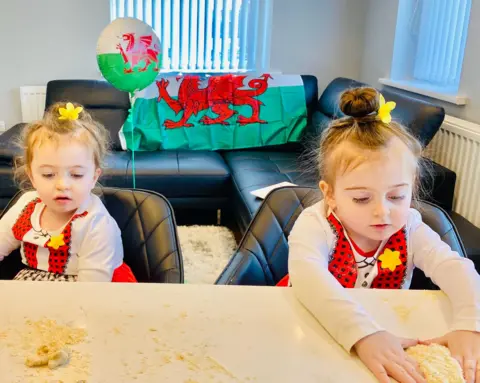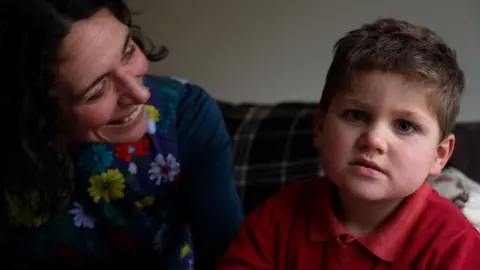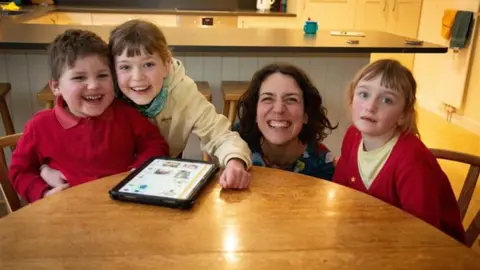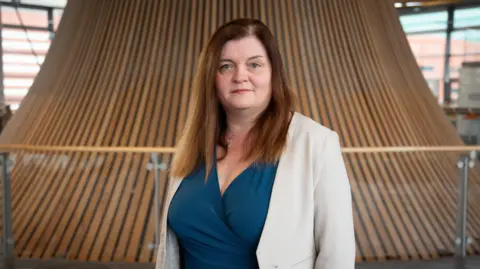Mum told to 'give up' career to care for daughters
A mum of autistic twin girls said she has repeatedly been advised to give up work to care for them full-time due to a lack of affordable childcare.
Betsan, from Trebanos, Swansea, said she wanted to give her "princess-loving" girls "a full life", but could not afford to do that without working.
She said friends, council employees and a disability organisation had suggested she "give up work" when she struggled to find suitable care for her daughters during the school holidays.
The Welsh government said it was working to ensure all children had access to childcare and the opportunities that came with it.
Bowann and Brielle are Betsan's "fabulous and sassy" eight-year-old twins.
They are both autistic, require one-to-one care and are non-verbal, although have recently started to say a few words and sentences, much to their parents' delight.
But Betsan, 49, said the juggle of caring for the girls, caring for her mother and her job in TV production could be absolutely exhausting.
"Just even getting up in the morning, having to hold them down to brush their teeth and put them in bear hugs to brush their hair and to dress them with meltdowns... it is a huge struggle," she said.
"That is before I even get to work."
 Family photo
Family photoBetsan said she and her husband "live off coffee and Diet Coke" because the girls do not sleep well.
But she said working gave her a personal focus and mental respite.
"When I do things for me, it helps me be a better mother," she said.
"I get to express myself and it's a huge distraction from the future because the future with my girls is scary."
Both girls attend school during term time, but during the holidays the cost of specialist childcare for them both is about £300 per day.
As a result, Betsan said "friends, social services, councils [and] charities" had previously suggested she gave up her job to care for the girls full time.
'I want to feel that I'm contributing'
"It's very, very surprising, even when one disability organisation told me 'well just give up work then'," she said.
"But to me, that's not the answer, because I want to work, I want to feel that I'm contributing.
"I want the benefits of a nice lifestyle for my children. I want to be able to feel that I can give them what I want to give them. And that's not super luxury."

Sarah, from Monmouth, has a five-year-old son called Ivor who was diagnosed with Angelman syndrome just before his third birthday.
Angelman syndrome is a rare genetic condition that affects the nervous system and causes severe physical and learning disabilities.
Sarah said continuing to work as a solicitor had given her a sense of balance and stopped her from becoming "saturated" by her son's disability and what may lie ahead.
"He's doing really well," she said.
"He's walking - albeit with a slightly funny gait - but he's walking. He can't talk but I think he's saying 'mama'... these small things are just amazing."
The mum-of-three said her employer had been really supportive, and she now worked remotely across three shorter days during term time only.
"Work wouldn't work if it wasn't flexible," she added.

Sarah usually wakes up at 06:00 GMT to do an hour's work before the children wake up and she gets them ready for school.
"Ivor can't do anything himself, he can't dress himself, he can't get from A to B, so all that [is an] extra layer of complexity," she said.
"Finally I get them on the school bus, run inside, grab a cup of tea, sit down at my desk and the sense of peace is utterly amazing, sitting there and just not moving."
Sarah said she had a great experience settling Ivor into the local school, but holiday care was "practically non-existent".
The working carer said she wanted to raise awareness of the reality for families like hers, and many others across the country.
She added she worked "really hard" in her job and, in between sending emails or finishing reports, she was taking care of appointments, attending meetings and filling out forms.
"It is endless," she said.

A report by the Senedd's children, young people and education committee found many children with disabilities or additional learning needs were being denied the right to an education.
Families told the committee that the lack of access to childcare had a significant impact on the parent or carer's ability to work.
Sioned Williams, Plaid Cymru MS for South Wales West, previously raised Betsan's story in the Senedd and said it was heart-breaking to hear a constituent had been told to give up work.
"Just getting through the day is enough without having to constantly write letters to their elected representatives, to be fighting their cases, to be appealing decisions. That's the first thing that has to stop," Ms Williams said.
A spokesperson for the Welsh government said councils were encouraged to give "special consideration and support" to the childcare needs of families with children with additional needs and disabled children.
"Through our Children and Communities Grant, local authorities can access funding to meet the needs of local communities and address any gaps in providing sufficient childcare opportunities," they added.
The Welsh Local Government Association (WLGA) said councils worked hard to ensure all parents who needed it could access suitable childcare, with particular consideration given to parents of disabled children.
"It is a challenging time for the sector both financially and in terms of recruitment and retention, as well as for councils who are facing huge funding pressures," a spokesperson said.
The WLGA added it welcomed the news the Welsh government budget would include extra money to support childcare providers, but felt the challenges remained.
